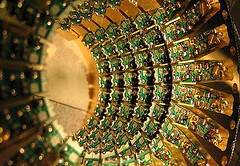The Physics of Possibility is Computational Reality
Canadian Company Sells Quantum Computer to Google
By: Grace Kennedy, Staff Writer
Quantum physics can be a little hard for anyone to wrap their head around. It is where particles act both as particles and as waves, where it is impossible to know both the position and the speed of any given particle. [pullquote]As Neils Bohr said, “anyone who is not shocked by quantum theory has not understood it.”[/pullquote]
But now, this domain of theoretical physicists has come down to the level of engineering.
The Vancouver-based company D-Wave has not only created a 512-qubit quantum computer, but sold it to Google, NASA, and the Universities Space Research Association (USRA) for their new Quantum Artificial Intelligence Lab.
This computer, the D-Wave Two, uses qubits, rather than the silicon computer’s regular bits, for its computing power.
Normal bits are always in one state or another – ‘on’ or ‘off’, ‘zero’ or ‘one’ – and the classical computer memory exists as one list of zeros and ones. According to the website Ars Technica, qubits are different from normal bits in that they are able to exist simultaneously as both a zero and a one; quantum memory can exist as all possible lists of zeros and ones at the any given time.
[pullquote]This makes quantum computing extremely efficient as, in the words of Joseph Altepeter in the article “A tale of two qubits” on the website, “this symphony of possibilities split and merge, eventually coalescing around a single solution”.[/pullquote]
However, D-Wave’s super-computer may not be a viable option for the public yet.
The computer is designed for the industrial problems that the government, Fortune 500 companies, and academia currently encounter. It is housed inside a 10 square metre shielded room with a cryogenics system to keep it artificially cool – close to absolute zero.
In addition, the Calgary Herald places the price of the D-Wave Two sale for the Quantum Artificial Intelligence Lab at $20 million.
However, through the USRA, academics will have a chance to engage with the quantum computer.
Grace Kennedy is a journalism student at the University of King’s College in Halifax, Nova Scotia. She has done freelance journalism on both the East and West coasts and has a particular interest in science journalism.
Sources:






























Share the post "The Physics of Possibility is Computational Reality"